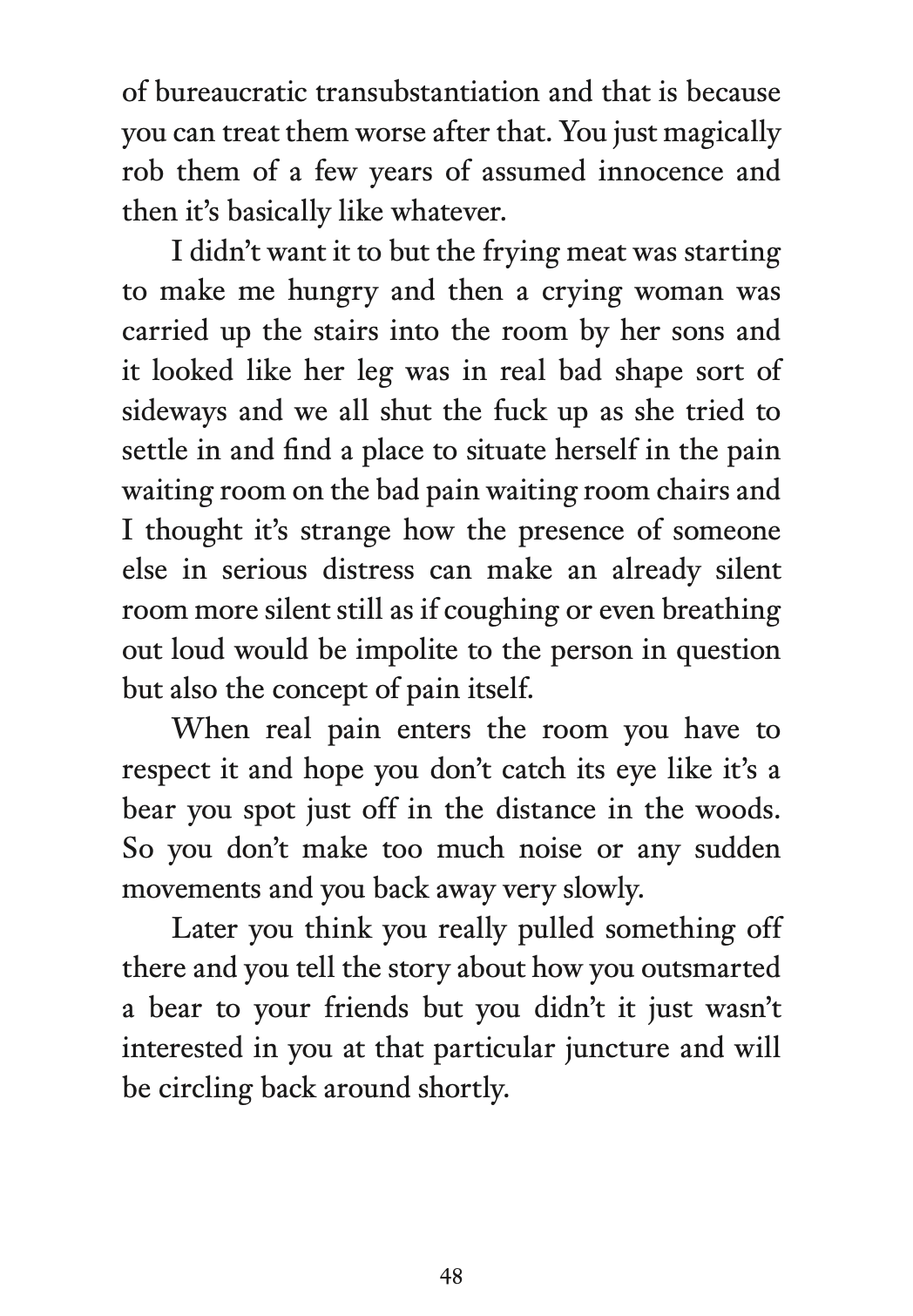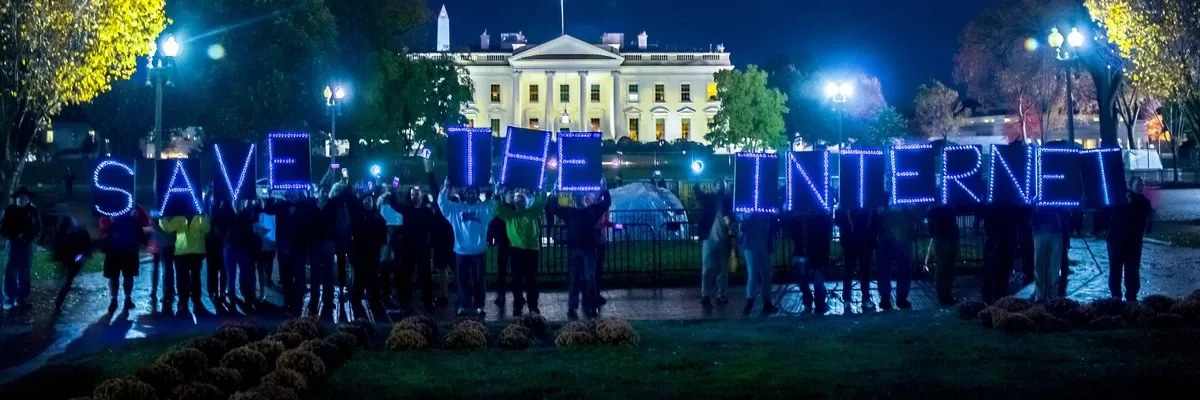An unholy alliance

I hope everyone had a nice Thanksgiving!

I had a very nice time myself visiting my family and staying with my in-laws and getting together with old high school friends. Then after that like all good cosmopolitan liberals everywhere I sat down to read this delightful new essay by celebrated humorist David Sedaris on Bari Weiss' blog about how you can't beat your kids anymore.
Black Friday is stupid but if you want to spend some money to support your old pal Luke here's a coupon for 28% off one year of Hell World.
Our main story today is by Evan Greer of the digital rights nonprofit Fight for the Future about a slew of harmful internet censorship bills currently being considered by Congress.
"In the end, whether they’re well-intentioned or blatantly fascist, censorship bills are premised on the false idea that we protect young people by shielding their eyes and stopping them from learning about the world, rather than by arming them with information, access to community, and the freedom to express themselves," she writes.
A couple months ago Austin L. Ray of How I’d Fix Atlanta wrote for Hell World about their effort to raise money to cancel medical debt in Georgia.

Thank you to any of you who chipped in. The group raised $25,000 and were able to cancel $3.1 million in debt.
Good morning.
— 🍂 thankful austie 🦃 (@austinlouisray) October 30, 2023
I have some info to share from @RIPMedicalDebt:
* We raised $25,323.30 across 326 donations
* We abolished $3.1M of medical debt in 115 different Georgia counties
* We helped more than 3,000 families
Thank you so much.
Let's do it again next year, but bigger. pic.twitter.com/JOdfo9rIXQ
You may have also seen this story recently about a 38 year old woman named Casey McIntyre who died from ovarian cancer last week. After she passed her family posted a note she had written asking people to donate to RIP Medical Debt. Her dying wish raised $600,000 and canceled roughly $60 million in debt.

You know my feelings on these types of "feel good stories" well. They're an indictment of our country. How we are made to suffer under this horrific and punitive for-profit medical care system. That said helping people is helping people and I'm happy that so many have been unburdened by efforts like these.
Hundreds of people in the crowd raised Palestinian flags and led chants pic.twitter.com/jXlx4fyDVx
— Lux Magazine (@readlux) November 23, 2023
how not to win friends and influence people https://t.co/x8mpDmUG4A
— Philip Gourevitch (@PGourevitch) November 23, 2023
If there were a cause I was invested in I would simply publish an article about it in The New Yorker like any reasonable person.
I'm sure this guy is just some crank writer who isn't aware of the horrors of genocide though. Let me look up what the name of his book is real quick... Says here it's called We Wish to Inform You That Tomorrow We Will Be Killed With Our Families: Stories from Rwanda.
Hm.
Listen to this boy.
"I swear that life is beautiful this way without the sounds of Israeli drones."
Today is the 1st time in 17 YEARS (you read that right) that Gaza's skies are free of Israeli predator drones, albeit temporarily
— Muhammad Shehada (@muhammadshehad2) November 24, 2023
& look at the immense happiness on this child's face
These drones are usually over Gazans heads 24/7 with a traumatic noise getting loudest at night pic.twitter.com/UWZA1cOaNZ
"The hostages to be freed are women and children, and the Palestinian prisoners are also women and people aged 18 and younger," the Guardian wrote of the so-called ceasefire and hostage exchange going on today.
This thing much of the media and many supporters of Israel's genocidal campaign have been doing – sometimes contradicting themselves within the same sentence – where Israelis are granted the innocence of childhood and Palestinians are referred to as "children" or young men under 18 or presumed as combatants etc is so fucking sickening man. It is shocking and it should shock us.
(Although not so fast there Americans because our people do it all the time when it comes to Black children and migrants at the border as well.)
Anyway I wrote about that sort of thing in one of the stories in A Creature Wanting Form. I probably already shared this one but I forget and it doesn't matter.
"There are only two things most of us know for sure if we are lucky which are our birthdays and our names but we’ve long taken even those away from people who we decide don’t deserve them. Even now we promote children into adults through the power of bureaucratic transubstantiation and that is because you can treat them worse after that. You just magically rob them of a few years of assumed innocence and then it’s basically like whatever."



The unholy alliance in Congress that wants to censor the Internet
by Evan Greer
The two most bipartisan issues in Washington, D.C. are funding endless war and censoring the internet.
This sad truth will be on display in coming weeks as Congress debates the National Defense Authorization Act (NDAA) and other “must-pass” spending measures. While billions for missiles and tanks are more or less a given, lawmakers will negotiate over which other legislative ornaments to hang on these anti-democratic “Christmas tree” bills.
Human rights advocates are bracing for an onslaught of Bad Internet Bills, as we’ve dubbed them, that lawmakers from both parties will be trying to ram through or quietly tack on to broader spending packages in the final hours.
Substantively, these bills range from requiring government backdoors in encrypted messaging apps like WhatsApp and Signal, to forcing social media platforms to filter out content the government deems “harmful.” But they’re all more or less being marketed the same way: we have to pass them to protect the kids.
The “think of the children” push to control what we can see and do online was already raging way back when I was a teenager on the internet in the late 1990s. That movement was adjacent to Tipper Gore’s crusade against metal and rap music, and not unrelated to the post-Columbine evidenceless panic about violence in video games. But it was most firmly rooted in right wing Christian evangelism. It was part of the same holy war as abstinence-only sex education and obscenity laws, but for the internet.
In the end, whether they’re well-intentioned or blatantly fascist, censorship bills are premised on the false odea that we protect young people by shielding their eyes and stopping them from learning about the world, rather than by arming them with information, access to community, and the freedom to express themselves.
Some of the main characters in the modern internet holy wars are no strangers to the fight. The intentionally official sounding National Center on Sexual Exploitation, for example, which portrays itself as a nonpartisan nonprofit working to end human trafficking, are major backers of legislation like the EARN IT Act. You may remember the group from their previous incarnation as "Morality in Media. Back then they were a bit more forthcoming about what they believe, for example that gay marriage causes mass shootings. Their CEO, Patrick A. Truman, previously held senior roles at SPLC-designated hate groups including the American Family Association, Family Research Council, and Americans United for Life.
These sex-phobic true believers have found powerful allies among opportunists on the Democratic side who are so eager to appear “tough on Big Tech” that they’re willing to work with people like Marsha Blackburn, who says her top goal with Internet legislation is to “protect minor children from the transgender.”
A sort of unholy alliance has formed between Republicans like her who want to remake the internet in the image of white Christian nationalism, and Democrats who have bought into the magical thinking that there is a neat and clean way for the government to rid the internet of “bad” things like hate speech and disinformation, while preserving “good” things like drag queen story hour and access to information about abortion.
As they often do, the politicians and pundits pushing these Bad Internet Bills are exploiting legitimate fears and grievances, but pedaling false solutions. They point to legitimate problems: like pervasive online harassment targeting women and people of color, antisemetic and racist posts artificially amplified by profit-driven algorithms, and the spread of horrific child abuse material online. But rather than going after the business model, profit incentives and material conditions driving these harms, the proposals that have advanced the furthest in Congress have mostly focused on expanding government censorship and requiring tech companies to engage in more surveillance. (Making sure all kids have access to enough food, a safe place to live, and don’t have one of their parents needlessly incarcerated would do a lot more to reduce child abuse and exploitation than any law we could pass policing the Internet, but no one in Congress seems to want to talk about that.)
I think we can all agree that the internet is pretty great. But the hyper-centralized, surveillance-driven corporate hellscape version of it dominated by Big Tech sucks. And it’s true that it especially sucks for kids, although the research on exactly how and why it sucks is not quite as clear as a lot of politicians and pundits make it out to be.
What’s infuriating is that all of this bipartisan angst in Congress could actually be used productively if they’d stop acting like children themselves while claiming they’re trying to protect them. The surveillance capitalist business model employed by Big Tech monopolies like Meta, Google, and Amazon is fundamentally incompatible with basic human rights and democracy. We urgently need lawmakers to pass even the most basic of privacy laws cracking down on the data harvesting machine that powers these companies’ harm, and antitrust reforms to break the anti-competitive feedback loop that allows such a small handful of companies to have so much gatekeeper power.
There’s still a chance we can make that happen. But first we need to stop this next wave of terrible and misguided bills from advancing. Here’s a quick rundown on what we’re up against and how you can help. You can easily write and call your Senators opposing all these bills at the same time at BadInternetBills.com
Kids Online Safety Act (KOSA)
KOSA is probably the biggest U.S. legislative threat to human rights on the internet right now. It’s not only one of the worst, and it’s also one of the most likely to advance in the Senate. KOSA would make kids less safe, not more safe, by creating a vague “duty of care” for social media platforms to “act in the best interest of minors” by filtering out content that leads to specific mental health outcomes, like anxiety, depression, and eating disorders. That sounds really reasonable on its face, but in practice, it basically means that state attorneys general will get to go after platforms for allowing young people to encounter any type of content they claim causes anxiety or depression. That’s a blank check for bigots to target LGBTQ content, anti-racist content, abortion related content, you name it. The bill’s sponsors, Marsha Blackburn (R-TN) and Richard Blumenthal (D-CT), have made some changes to the bill, and they’ve been going around lying to anyone who will listen, claiming those changes fix all the problems that have been raised. They don’t. That’s why dozens of human rights, LGBTQ, and civil liberties organizations oppose KOSA, along with hundreds of parents of transgender kids. There are a few decent parts of KOSA, including a ban on targeted advertising to kids. We’ve been pushing for Congress to take some of those parts and pass them, without the stupid censorship stuff.
NEW: @SenatorCantwell has told reporters she plans to "hotline" #KOSA.
— Evan Greer is on Mastodon and Bluesky (@evan_greer) November 10, 2023
This is insane. The bill is substantively opposed by dozens of LGBTQ, human rights, racial justice, & abortion rights groups.
74 more LGBTQ groups just came out against it last week. https://t.co/kx2Qn5V6Os
STOP CSAM Act
This is the other bill I think is most likely to get shoehorned into a last-minute spending package before the end of the year. It claims to be addressing a horrific problem: online sale of child sexual abuse material (CSAM). But experts have repeatedly explained why it would fail to do that, and instead would lead to widespread over-removal of marginalized people’s speech. Similar to the EARN IT Act (more on that below) this bill makes a lot of the same mistakes as SESTA/FOSTA, one of the last Bad Internet Bills that actually passed, which was a catastrophe that led to widespread censorship of vaguely sexual content and got consensual sex workers killed. This letter from a big coalition of human rights groups explains why the STOP CSAM Act is so bad. But the good news is we still have a chance of stopping it if enough people call and email their Senators to make sure leadership knows it’s controversial.
Protecting Kids On Social Media Act
This bill is so deeply silly that even some of the organizations who misguidedly support KOSA, like Fairplay and Common Sense Media, don’t support it. Basically it’s aimed at kicking teenagers off the internet unless they have their parent’s permission. That’s unconstitutional. Teenagers have 1st amendment rights to express themselves. The government can’t stop them from posting a TikTok without their parents’ permission any more than the government can stop them from writing a letter to the editor or attending a protest without their parent’s permission. It’s also just a terrible idea, especially for LGBTQ youth who have unsupportive parents. Bills like this that require age-verification or age-gating are also fundamentally incompatible with online anonymity, which is essential for free expression and human rights, especially globally. If you’re a queer activist in Saudi Arabia, you’re not gonna upload your ID before posting criticism of the government.
EARN IT Act
Like the STOP CSAM Act, the EARN IT Act is supposed to be about stopping the very real problem of online sexual abuse of children. But once again, instead of doing any of the things experts say would actually accomplish that, this bill focuses on censorship and surveillance. The most dangerous part is that it could criminalize end-to-end encryption, the basic privacy software that keeps your messages safe when you use an app like Signal, WhatsApp, or even iMessage. “End to end” means only the sender and receiver can read the message, not the company. The EARN IT Act is part of a broader set of proposals aimed at installing government backdoors into encryption, or forcing companies to scan the contents of encrypted messages. Backers of these proposals say the government can pinky swear to only use those surveillance tools to look for real bad guys. If you’ve read this far I’m guessing I don’t have to explain to you why that’s a terrible idea. The Senate has made a few attempts to pass the EARN IT Act but we’ve managed to stop it each time by driving lots of phone calls and emails against it. We can do it again this year.
Bonus bad idea: Banning TikTok
I thought that moral panic and xenophobic hand wringing in D.C. about TikTok had reached its peak when a Republican Congressman called the app a “Chinese spy balloon in your pocket.” I wrote at the time about why calls to “ban” the app are stupid and unconstitutional, but man, even I wasn’t ready for the full on media meltdown around the (proven false) idea that the Chinese government is using TikTok as a sort of propaganda superweapon to turn millions of U.S. teenagers into Osama Bin Laden loving haters of Israel. Of course, that’s not the case at all, it’s just that young people aren’t super duper into genocide these days I guess. Kids these days right? In any case, banning TikTok clearly violates the First Amendment, and it’s just a silly idea. But we could totally pass strict privacy laws that would basically put TikTok (and Meta, and Amazon, and YouTube etc) out of business. I’d be down for that.
Some Good Internet Bills
There are very real harms stemming from Big Tech and particularly social media companies, but censorship is not the solution. If lawmakers want to actually help, they should focus on regulating surveillance and monopoly abuses rather than regulating speech. A few ideas:
- Pass the American Innovation and Choice Online Act (AICOA) and the Open App Markets Act (OAMA), two antitrust bills that would crack down on Big Tech monopoly abuses, creating more space for alternatives like Mastodon, as one example, to thrive.
- Pass the My Body My Data Act, proposed post-Roe to protect sensitive health data.
- Pass the Government Surveillance Reform Act to finally rein in the government’s post-911 warrantless surveillance programs.
- Pass a comprehensive data privacy law that protects everyone, and doesn’t require companies to engage in age verification. There was a decent start last year with the American Data Privacy Protection Act (ADPPA), but it needs to be improved and passed rather than watered down further by industry.
- Pass the SAFE SEX Workers Study Act, a bill to study the harm done by SESTA/FOSTA. If lawmakers want to responsibly legislate in this area, they should learn from their past mistakes.
The decisions we make about technology and the policies governing it are some of the most consequential decisions we are making as a human civilization right now. I know it can feel a bit overwhelming. For the most part, I don’t think you need to always be paying attention to legislation like this and panicking about it. But when organizations like mine (Fight for the Future) sound the alarm, be ready to make your voice heard. We try not to throw up the Bat Signal until it’s really necessary. Right now is one of those moments.
You can easily write and call your Senators opposing all the Bad Internet Bills listed above using the handy tool we built at www.badinternetbills.com.
And you can also easily write and call supporting some good internet bills and watch some cool videos we put together with Exposure Labs here: www.takebackourinternet.org.
Oh, and don’t forget to check out Fight for the Future’s new newsletter Touch Grass.
Evan Greer is an activist, writer, and musician based in Boston. She’s the director of the viral digital rights nonprofit Fight for the Future and a regular commentator on technology, human rights, and LGBTQ issues. Her last album, “Spotify is Surveillance,” was featured in Rolling Stone and Pitchfork and hit the very bottom of the Billboard charts.

